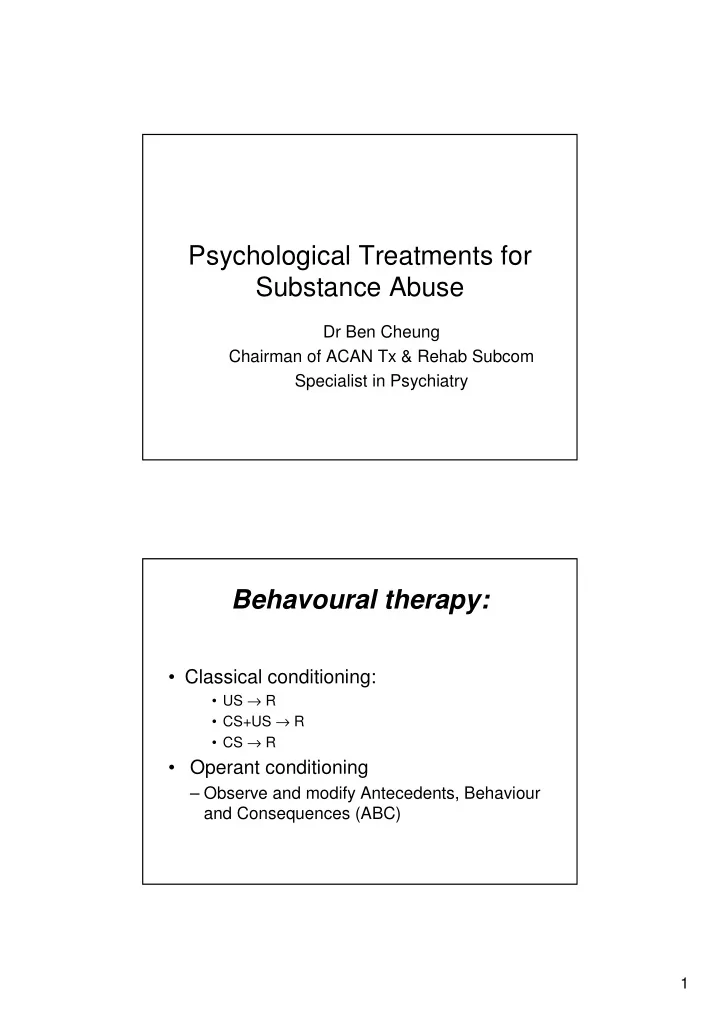

Psychological Treatments for Substance Abuse Dr Ben Cheung Chairman of ACAN Tx & Rehab Subcom Specialist in Psychiatry Behavoural therapy: • Classical conditioning: • US → R • CS+US → R • CS → R • Operant conditioning – Observe and modify Antecedents, Behaviour and Consequences (ABC) 1
Terminology Stimulus Stimulus not presented presented reinforcement + ve -ve reinforcement ( ↑ ↑ ↑ beh ) ↑ reinforcement punishment punishment by punishment by ( ↓ ↓ ↓ beh ) ↓ application response cost Aversion therapy Punishment aversive stimulus aversive stimulus follows coincides with the the response response help patient to suppress to suppress wrong doing the wanting to do something Examples: Disulphram, Electric shock 2
Conditioning and SA • Repeated pairings of particular events, emotional states, or cues with substance use can produce craving for that substance • Over time, drug or alcohol use is paired with cues such as money, paraphernalia, particular places, people, time of day, emotions • Eventually, exposure to cues alone produces drug or alcohol cravings or urges that are often followed by substance abuse Principles to fight SA • Learn strategies to avoid exposure to triggers • Cope with craving to reduce / eliminate conditioned craving over time 3
Operant conditioning & SA • Once a person is addicted, drug use is reinforced by the negative reinforcement of removing or avoiding painful withdrawal symptoms. • Positive reinforcement strengthens a particular behaviour (e.g., pleasurable effects from the pharmacology of the drug; peer acceptance) Operant conditioning & SA • Punishment is a negative condition that decreases the occurrence of a particular behaviour (e.g., If you sell drugs, you will go to jail. If you take too large a dose of drugs, you can overdose.) • Negative reinforcement occurs when a particular behaviour gets stronger by avoiding or stopping a negative condition (e.g., If you are having unpleasant withdrawal symptoms, you can reduce them by taking drugs.). 4
Principles to fight SA • Functional Analysis – identify high-risk situations and determine reinforcers (When? Where?Why?With / from whom?) • What happened? • Examine long- and short-term consequences of drug use to reinforce resolve to be abstinent • Schedule time and receive praise • Develop meaningful alternative reinforcers to drug use Cognitive Behaviour Therapy • CBT is a form of “talk therapy” that is used to teach, encourage, and support individuals about how to reduce / stop their harmful drug use. • Emphasises the development of new skills • Involves the mastery of skills through practise 5
CBT • Irrational automatic ideas change by : – interruption of cognition – questioning – provision of futher information – neutralizing the emotional effect of irrational thoughts CBT for SA In the early stages of CBT treatment, strategies stress behavioural change. Strategies include: • planning time to engage in non-drug related behaviour • avoiding or leaving a drug-use situation. 6
Early targets attempts to help clients: – Follow a planned schedule of low-risk activities – Recognise drug use (high-risk) situations and avoid these situations – Cope more effectively with a range of problems and problematic behaviours associated with using Later phase more emphasis is given to the “cognitive”, Such as: – Teaching clients knowledge about addiction – Teaching clients about conditioning, triggers, and craving – Teaching clients cognitive skills (“thought stopping” and “urge surfing”) – Focusing on relapse prevention 7
Relapse Prevention Broadly conceived, RP is a cognitive- behavioural treatment (CBT) with a focus on the maintenance stage of addictive behaviour change that has two main goals: – To prevent the occurrence of initial lapses after a commitment to change has been made and – To prevent any lapse that does occur from escalating into a full-blow relapse Psychodynamics in addiction (Importance of early experiences) •Addition: a metaphor for human condition, searching for happiness in material things, implying one being inadequate, despite it always lead us to pain and conflict •Analogy: film-projector-screen thought-mind-life 8
Addictive Mode • scarcity: I am lacking and inadequate, searching something to make it up • judgement: whenever you make a negative judgement, you made a decision to experience conflict rather than peace (guilt, feelings of inadequacy, comparison, low self-esteem) • living in past or future: past recentment, future problems) • fear: not at ease with self and others Healthy Mode: • abundance: what is of value does not need to be guarded. Value increase through giving • acceptance: paradox of change • present moment: Whenever you are holding on to past and future, you are lookng nowhere, and seeing things that are not there. • love: not because of what you do or have 9
Other therapies • Self help groups • Family therapy--coaddiction • Marital counselling • Rehabilitation programmes 10
Recommend
More recommend